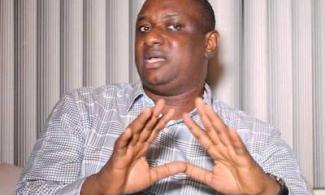
He described fuel subsidies as no longer viable because according to him, the Nigerian National Petroleum Company (NNPC) is putting virtually all its revenue into subsidising fuel.
Festus Keyamo, spokesperson for the Presidential Campaign Council of the All Progressives Congress (APC), has said plans to remove fuel subsidy will start in 2023.
Keyamo, who also serves as the Minister of State for Labour, said this on Tuesday in Abuja during the launch of The Progressives Forum.
The minister disclosed that the Nigerian government relies on revenue generated by the Federal Inland Money Service (FIRS), Nigeria Customs Service, and some other government agencies to pay salaries.
He described fuel subsidies as no longer viable because according to him, the Nigerian National Petroleum Company (NNPC) is putting virtually all its revenue into subsidising fuel.
He said, “As a progressive party, we believe there must be intervention in the lives of the very poor and the middle class.
“That is why we have conditional cash transfers to the very poor. That is the philosophy of President Muhammadu Buhari, that is the philosophy of APC. We care a lot for the poor.
“If it were to be other government existing today as I speak with you, there would be no subsidy now.
“But President Muhammadu Buhari said before we remove it, we need to put some measures in place to cushion the effect on the poor because there is no longer any justification to retain subsidy as I speak with you today.”
“We are in government, we cannot hide it again from the masses, from the people. We must all keep saying that subsidy has eaten deep into our country, into our economy.
“Nigerian National Petroleum Corporation (NNPC) is no longer remitting money to Federation Accounts Allocation Committee (FAAC). So, all the money they earn goes to subsidy. So, the government has to rely on revenue from Customs, from Federal Inland Revenue Service (FIRS), from others to pay salaries and other things.
“But it is still the sympathy that the President has for the poor because he feels that we have to put measures in place to cushion the effect on the poor before they remove subsidy. And that is why they’ve pushed it to sometime next year. The conversation on how to remove subsidy will begin,” he added.
Meanwhile, when he ran for president in 2011, President Muhammadu Buhari who doubles as the Minister of Petroleum Resources, criticised former President Goodluck Jonathan's proposal to end fuel subsidies, calling it a fraudulent policy.
Buhari had vehemently contended that there was no fuel subsidy in an interview, claiming that the economic strategy had given the previous administration a way to grease the wheels of corruption.
If elected, he also pledged to end fuel subsidies and further lower the price of petrol or Premium Motor Spirit at the pump.
“Who is subsidising who?” he queried while explaining why subsidy payment is a fraud.
"If anybody told me about subsidy, he is a fraud. There is so much fraud I don’t want to talk about, but the day I have to talk about it, I will invite a petroleum economist to come and tell me who is subsidising Nigerians,” he fumed.
Buhari further argued how during his time as a petroleum minister, from 1976-78, there was no mention of subsidy payment.
“What I understand that Nigeria should charge Nigerians is the cost of one barrel at the wellhead and then the cost of transportation to the refinery, the cost of refining it and its cost at the pump.”
Based on his economics, he concluded: “If anybody says he is subsidising anything, he is a fraud."
Fast forward to 2022, and seven years into Buhari’s government, the National Assembly approved the request of the President to earmark N4 trillion for petrol subsidy.
With fuel subsidy, a fraction of the price that consumers are supposed to pay for the product is paid by the government so as to ease the price burden.
After hearing findings from the financial committees, the lower and upper legislative chambers supported the president's request.
In 2021, petrol subsidy payments gulped N1.43 trillion.